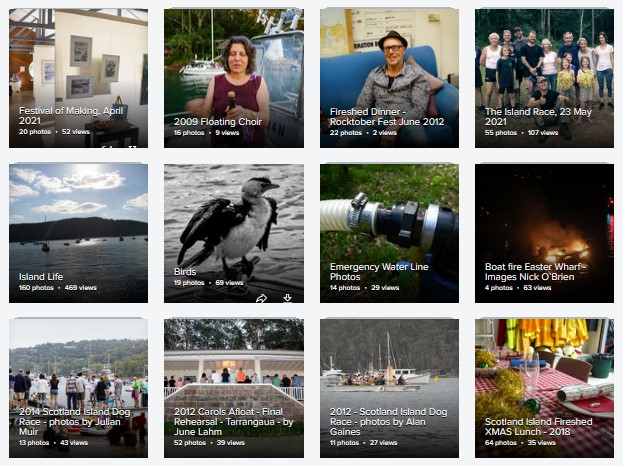| Having trouble reading this newsletter? Visit https://ymlp.com/archive_gesgjgm.php | ||||||||||||||||||||
 |
||||||||||||||||||||
February 1, 2023 |
||||||||||||||||||||
|
Newsletter for the
Offshore Residents of Pittwater, Australia - Volume 24,
Issue 1190
We acknowledge and pay our
respects to the Traditional Custodians of
Pittwater, as well as our Indigenous readers
|
||||||||||||||||||||
Contents:
The PON: 2022 IndexA few people have pointed
out that it's not easy to find articles in back issues
of the PON. All PONs are available from the PON archive, but I realise that
the archive is not easily searchable.
Until I find a better
solution, I propose including in each 1 January
edition an index for the previous year's main items.
That way at least you only have to look at the first
edition of each year to find an article. Unfortunately
I forgot to include this index in the last edition,
but I offer it now for 2022.
On another point of
housekeeping, I am aware that some email clients,
including Microsoft Outlook, mess up my careful
formatting, making the PON less easy to read. If you
are having that problem, I encourage you to always
read the PON at the archive referred to above: click here.
(You will always find that link at the very top of
each PON.) That way you will see them in their full
glory.
Scotland Island Community VehicleAre we sure we need it?Roy Baker
There are more than 60
vehicles on Scotland Island, and I suspect we’ve hated
all of them at one time or another. They contribute to
global warming, ruin our roads, endanger our children
and congest the island with their parking. I’m pretty
certain none of us enjoy having any of these vehicles
here. Except for the one we own, of course.
And there’s the rub. The island is too small to accommodate many vehicles, yet just large and hilly enough to pose real difficulties for some households. How do you get home in the rain with screaming kids and bags of shopping? I recently became a community vehicle driver, and yes, dear passenger, I’ve seen the despair in your eyes. Talk about the tired, the poor, the huddled masses yearning to get home. Keep, Church Point, your storied pomp! Send me the wretched refuse of your teeming shores, for I, the community vehicle driver, will escort them to their doors. 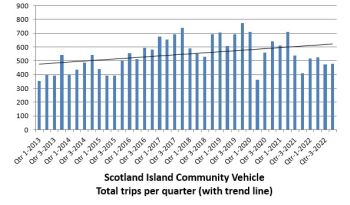 You
probably don't give the vehicle much thought, but its
statistics are truly staggering. In the last ten years
it has provided islanders with access to their homes
on more than 20,000 occasions. In doing so it has
driven a distance equivalent to almost twice the
circumference of Earth. That’s like driving from here
to Cambodia each year. You
probably don't give the vehicle much thought, but its
statistics are truly staggering. In the last ten years
it has provided islanders with access to their homes
on more than 20,000 occasions. In doing so it has
driven a distance equivalent to almost twice the
circumference of Earth. That’s like driving from here
to Cambodia each year.But what’s really interesting is who uses the vehicle. The answer is that most of us will find it comes in handy, sooner or later. An analysis of the vehicle’s logbook suggests that over one third of islanders benefit from it in any given year. Bear in mind that around
half of our residents live on the waterfront and have
a private jetty, so probably have little use for the
vehicle. That leaves about 170 non-waterfront
households. The number of homes using the vehicle in
2022 exceeded 130, suggesting that at least
three-quarters of non-waterfronters will fall back on
the vehicle at some stage.
Going by the second half of 2022, the mean average usage per island household is around five trips per year. If we deduct the households who never (or hardly ever) use the vehicle, and consider only those who used it at least once in 2022, that mean average usage goes up to slightly more than one trip per month. But mean averages are often misleading. What about medians? These give us a better idea of whether usage is evenly spread across the island or is concentrated to just a few households. It’s likely that around half of island households never use the vehicle. But if we consider only those that used it at least once in 2022, median usage stands at four trips per year. We have, then, a situation in which lots of households use the vehicle, but many of them don’t use it particularly often. Part of the purpose of this article is to imagine the island without community transport. Would we be inundated by lots more vehicles?
But what about regular users of the vehicle? Thirty-eight households (over 10% of the island) use the vehicle more than once a month. Nineteen use it at least once a fortnight, while eight use it more than once a week. We can’t assume that everyone who uses the vehicle regularly would rush out and buy private transport if the vehicle were withdrawn. But let’s imagine that half of them did. That would increase the number of vehicles on the island by a third. Twenty more cars and buggies. Could the island handle them? And the human cost of withdrawing the vehicle? A number of residents are too ill, frail or elderly to operate a car or buggy of their own. These people are charged a special concessionary rate by the drivers. Unsurprisingly, concession-holders tend to use community transport most. Out of the eleven households who use the island vehicle most regularly, seven (around two thirds) contain someone entitled to do so on a concessionary basis. That’s seven of our friends and neighbours who would be forced (or at least strongly motivated) to leave the island if community transport were withdrawn. Twenty more cars or buggies on the island. And half a dozen out of our community lost. Perhaps consider those numbers next time you see the community vehicle, that white knight of island roads, fulfilling its errands of mercy. One day you might need it too. Thanks to Cass Gye, John Morgan and Emma Lazarus for their help in writing this article. The Community Vehicle: a brief history
Legend
has it that island community transport was instigated
by former resident Chris Cromwell after seeing Jenny
Cullen struggle home with young children and heavy
shopping. But another part of the story is that a
group of residents, led by Jim Hinckley, a police
officer living on the island at the time, became
concerned about the number of unregistered vehicles. For further information on the community vehicle, click here. Alan Roy Hill, OAM
The PON
is well known for its obituaries. But this time I get to
sing the praises of an offshore resident, and personal
friend, while he is still with us.
Alan Hill, long-term resident of Elvina Bay, was awarded a much-deserved, and long-overdue OAM as part of last week’s Australia Day honours. Alan’s award is for service to conservation and the environment. Alan has devoted countless hours to bushland regeneration around Pittwater. But he is also secretary and treasurer of South West Rocks Community Dune Care, an organisation he was instrumental in setting up in 1992.
Alan grew up in a working class family in western Sydney. He started out in his father's clutch and brake workshops. He might have stuck at that, but he became concerned about the long hours spent with asbestos, and the associated health risks. Convincing himself he would be dead by 40, Alan chose to seize the day. And so he jacked it all in, turning to things he found more meaningful: environmental work, alongside enriching friendships. ‘I wanted to see what I could do to improve my relationships and my environment’, he says. He embarked on a landscape management course at Ryde TAFE, which led to awareness of Bitou Bush, an invasive weed that infests most of NSW’s coastline. The problem was particularly acute around South West Rocks, where Alan owns a house. It was there that he set up his bush care group.
Alan’s botanical knowledge is immense, and he is involved in community awareness raising in terms of threats to fragile ecosystems. For one of his videos, click here. Alan would never pretend to have achieved all of this alone. Besides him has stood his partner of 43 years, the indomitable Alan Yuille. Known locally as ‘the Alans’, the couple have devoted many decades to protecting not only the natural environment but also the Northern Beaches’ built heritage. The Alans have been great friends to the offshore community, and to many within the offshore community, myself included. We, and especially I, owe them a great deal. To learn more about the
Alans' dune care group, click here and here. Alan Hill was recently
profiled by the WPCA's BaysNews, and I am grateful to
them for their help with this article.
Roy Baker
Spot the Rat ExterminatorsThe Boobook Owls and how to protect themHazel Malloy 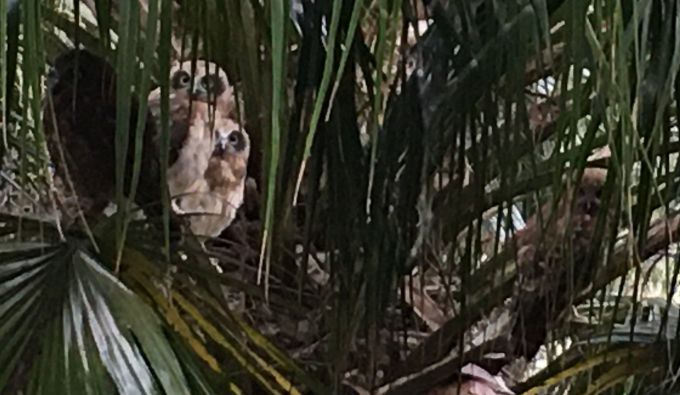 Can you find four rat
exterminators in the above photo?
I was on my deck on Sunday and managed to get a photo of four Australian Boobook Owls and their babies. The larger looking, lighter coloured owls are the fledglings, and their parents are darker, and better camouflaged. One adult is silhouetted. The babies look big because they still have lots of fluffy baby feathers which seem to be moulting right now. After the babies fledge, the family stays together while the young owlets learn owl business, which takes months. 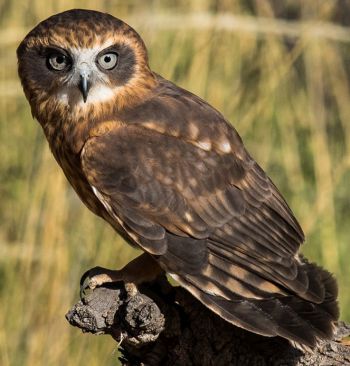 This is the owl
species that you often hear calling to each other at night
around Pittwater, especially in winter. Boobooks make
other sounds which you hear in the early evening. They
call to each other and their parents with a distinctive,
cricket-like trill, and the adults sometimes make a
croaking trill, especially before they fly off to hunt in
the evening. You can hear their various calls by clicking
here. This is the owl
species that you often hear calling to each other at night
around Pittwater, especially in winter. Boobooks make
other sounds which you hear in the early evening. They
call to each other and their parents with a distinctive,
cricket-like trill, and the adults sometimes make a
croaking trill, especially before they fly off to hunt in
the evening. You can hear their various calls by clicking
here.We also sometimes have Powerful Owls breeding in this area. If you hear Noisy Miner birds making a big fuss near your house, you may find an owl at its daytime roost. Please don't use rat or mouse poisons, as rats and mice are the main diet for these owls. If an owl eats rodents that have been poisoned, it kills the owl. Instead, hire a carpenter to find and plug up any holes where rats are getting in. Or, cheaper still, plant groups of small native trees to give owls a sheltered place to roost on your block. We used to have a rat in our roof before the Boobook family started hanging around the house. Pythons also make great rat exterminators, and they are also killed if they eat a poisoned rat. Speaking of pythons, please take care while driving around the island. Pythons often come out onto the road, and are not always easily distinguishable from fallen branches, strips of bark and the like. If you stop for a moment then they are likely to slither out of your way fairly quickly.  Scotland Island Residents AssociationMeet the new committee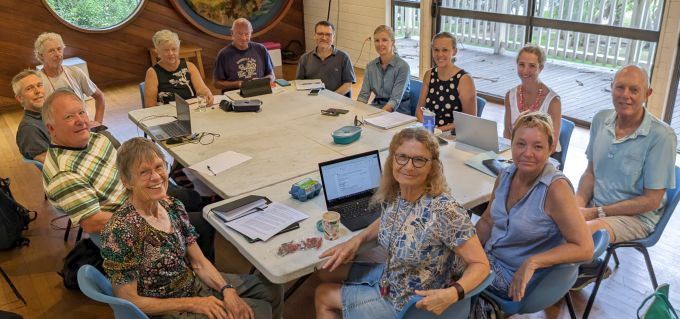 Following on from the SIRA
AGM in November, the newly elected SIRA Committee met
for the first time on Sunday.
The new committee has 15
members. In the above photo, starting top left and going
clockwise around the table, we have: Mark Martin, Robyn
Iredale (President), Ian White, Steve Seidman, Peta
Jacobsen, Julie Velina Cooper (Treasurer), Georgina Orr,
Robert Fox, Deb Wood (Secretary), CB Floyd (Vice
President), Sharon Kinnison (Vice President), John
Marshall and Boyd Attewell. Absent were Colin Haskell
and Jess Robinson.
The Scotland Island Events CalendarHow to schedule an event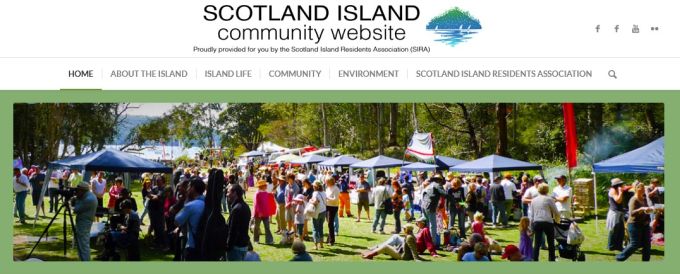 The Scotland Island community website
includes an events calender. And now it is
set up so that anyone can add events – whether you are
booking the Hall, the Recreation Centre, or creating
an event elsewhere.
By following a simple procedure, you can put your event on the calendar and the list of upcoming events on the home page. You can format your information and you can add images (such as a poster) and links (eg to ticketing sites). You can also give your event an appropriate category, so that others can find it easily using a filter, such as classes, performances, kids, groups, social, council, or SIRA. If you are booking the
hall, be sure to also select “_Hall Booked", so others
can see the hall is being used at that time. You can
even create a recurring event.
To create an event, go to
the website calendar and scroll down
– you’ll see full instructions and a form there. Or,
if you’re booking the Hall or the Recreation Centre,
you can add your event at the same time you book –
just follow the instructions provided to do this while
booking. To book the Community Hall, click here. To book the Recreation
Centre, click here.
Need more help? Here is a
handy help page to guide you through
the process. There are also instructions on how to
change details once you’ve posted.
It’s super easy and helps give your event the best coverage. So try it out with the next event you are involved in. Admins must approve all events but aim to do so within 24 hours. Remember that if you
only need the Community Hall toilets and not the
other hall facilities then it is possible to pay to
hire just the toilets. Use the hall booking form.
CB Floyd (Communications Team Leader) and Alec Beckett (IT manager for SIRA). Two Catherines: A Twisted Scotland Island TaleThe Scotland Island play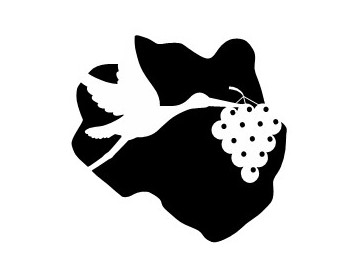 Coming this winter: a
play written especially for the Pittwater offshore
community.
The action focuses on two women: Catherine Benns and Catherine Bouffier. Benns, a local midwife, moved to Scotland Island in 1874, while Bouffier was mother-in-law to Herbert Fitzpatrick, who developed the island in the 1920s. Bouffier was also a prominent Sydney vintner, and the play is staged around a wine exhibition she is holding on the island. Residents are invited to taste her wines. But unknown to Bouffier, Benns' widower, Jo, is at the exhibition. He has a very different agenda, for he knows where his wife buried treasure on the island. Herbert and his wife Florence turn up unexpectedly and reveal that they've squandered the family fortune on their ruinous Scotland Island real estate project. To complicate matters, Tilly Devine and a chorus of wife-swappers also show up. And so the race is on to find Benns' treasure. The play has been written by a young playwright, Jasper Marlow, and is professionally directed by Sophie Lepowic, a resident of Elvina Bay. The performance is peppered with original music and songs by islanders Markus Plattner and Geoff Bullock. So come and join us for a rollicking adventure, a classic island farce involving wine, merriment, a little sex and lots of history, although admittedly very little of it is true. There
will be performances of the play as follows:
Times and full details
relating to ticket sales will be announced in due
course.
Beach PlaygroupCatherine Park, Scotland IslandTuesdays, 9 - 11.30 am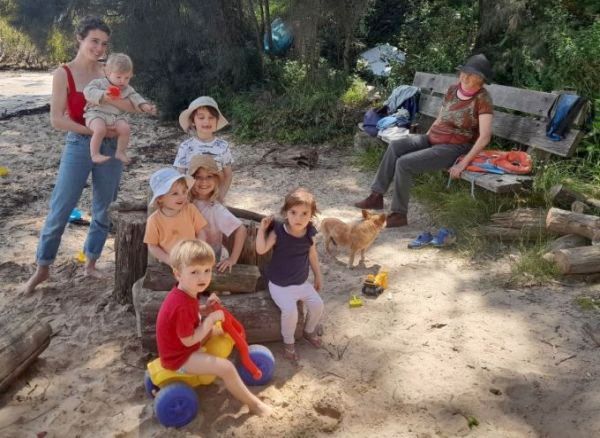 Jenny Cullen Fire Shed DinnerElvina Bay Fire ShedSaturday 4 February, 6.00 pm onwards What better way to welcome in the Chinese new year than with a fire shed dinner hosted by the auspicious Tai Chi Group. Don’t miss this wonderful community evening sharing food, laughter and conversation - in a festive traditional Chinese way, welcoming in a new year of good luck and prosperity. BYO: bring your favourite tipple RSVP and payment: by Thursday 2 February please to firesheddinner@westpittwater.com.au COST: $25 per person. Families $50. All proceeds go to support the work done by the volunteer members of the West Pittwater Rural Fire Brigade. Donations gratefully accepted. To help with catering, we ask that you RSVP and prepay via EFT. EFT details: West Pittwater Fire Brigade BSB: 032 196 Account: 960017 Ref: Add your surname as reference Fire Shed dinners are a volunteer community event. If you would like to help in any way it would be greatly appreciated. Please contact Angela Cooney on 0423 009022. West Pittwater RFS would like to stress that all fire brigade dinners are NO DOG events – so please leave pets at home for the evening. Shakespeare in the Park: OthelloCatherine Park, Scotland IslandSaturday 11 February, 7.30 - 10.30 pm For tickets click here.
Othello is a tragedy of
shadows – those seduced by the dark become darkness
itself. Even the once streetwise Othello succumbs to
Iago’s shadow-play. The proud warrior falls. Twisting
his love for Desdemona into hatred. And when love is
not, chaos comes again. Finally, the green-eyed monster
of Othello’s jealousy mocks the man it feeds on.
Such Stuff Productions presents Shakespeare’s timeless tragedy, Othello. Performing one Scotland Island show, February 11 2023. Wet weather contingency venue will be in the Scotland Island Community Hall. Tickets: adults $40,
concessions $20, children under 10 yrs free.
Refund policy: refunds are
available up to one day prior to the event.
Dru Yoga on Scotland IslandScotland Island Community HallTuesdays, recommencing 14 February, 9.15 - 10.15 am Dru is a potent and graceful yoga
based on Hatha philosophy. It comprises flowing sequences
of asanas (postures), breathwork and relaxation. Dru is a potent and graceful yoga
based on Hatha philosophy. It comprises flowing sequences
of asanas (postures), breathwork and relaxation. It is suitable for all ages and abilities and nurtures a sense of calm and connection. Cost: $20 Teacher: Katya Marden, Accredited teacher for over 14 years. Phone: 0414 187916 Email: kmarden1@gmail.com The Tuesday Discussion GroupScotland Island Recreation CentreTuesday 21 February, 11 am - 12.30 pmThe Recreation Club runs a discussion group, meeting on
the third Tuesday of each month, from 11 am to 12.30 pm
in the Recreation Centre. Everyone is welcome.
Read David Miller, in which he critiques cosmopolitanism, the doctrine behind the concept of world citizenship (4 pages); Read Thomas Pogge, in which he responds to Miller, and asserts that the idea of world citizenship warrants serious consideration (6 pages); Read Thom Brooks, in which he attempts a synthesis of Miller's and Pogge's positions, offering an intermediary view (6 pages). The group is administered via a WhatsApp group, which
will be used to distribute further information about
this and future discussions. If you would like to be
added to the group, send your mobile phone number to editor@scotlandisland.org.au. The Recreation Club asks for $5 per person per attendance to defray expenses. The Dark Side of the MoonTed Blackwood Hall, WarriewoodFriday 24 & Saturday 25 February, 7:30 pm Pink Floyd's The Dark
Side of the Moon was released in 1973 and became
one of the greatest albums of all time, spending more
than 18 years in the charts. The legendary Pittwater
offshore community's Flaming Doghouse Showband will
perform the full album, from heartbeat to heartbeat,
plus plenty of Floyd favourites - over two hours of
live, local music intended to sweep you back to 1973 and
blow your mind.
Flaming Doghouse have
performed many tribute shows over the years, including
The Beatles, Pink Floyd, The Commitments, The Rocky
Horror Show, The Blues Brothers and Lady Sings the Blues
- all to huge acclaim.
This show reprises, and
brings to the mainland for the first time, their classic
Pink Floyd show to coincide with the 50th anniversary of
the release of The Dark Side of the Moon.
'This has been a secret
Pittwater offshore project during the covid years - so
almost three years in the making', says musical director
David Richards. 'The Pink Floyd catalogue is a mind
blowing body of work. Dark Side is just the tip
of the psychedelic iceberg. We can't wait to play this
show for you'.
'We chose the Ted Blackwood
Hall in Warriewood to preserve the community feel that
has always been a part of the Flaming Doghouse persona,
to avoid the noise of commercial venues and because this
show just doesn't fit in a smaller space. In a way, it's
a bit nostalgic in that the big live shows on the
northern beaches in the seventies were in the larger
community halls'.
Dark Side struck a collective nerve, becoming one of the most critically acclaimed records in history. The glow of that impact still shines as we celebrate it 50 years later. To buy tickets, click
here.
 International Folk DancingScotland Island Community HallSaturday 25 February, 7 - 9 pm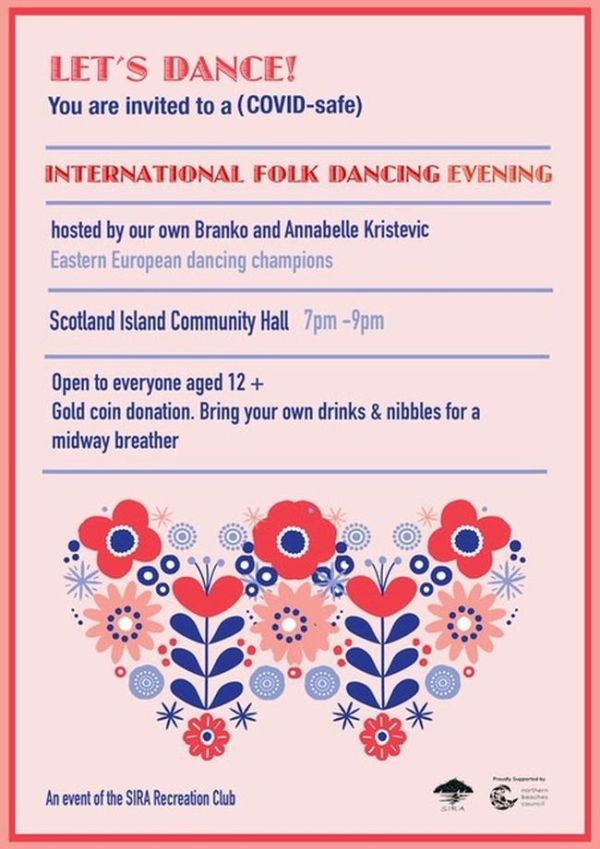 The Recreation Club
asks for $5 per person per attendance to defray
expenses.
Scotland Island CaféCatherine Park, Scotland IslandSunday 26 February, 10 am - 12 noon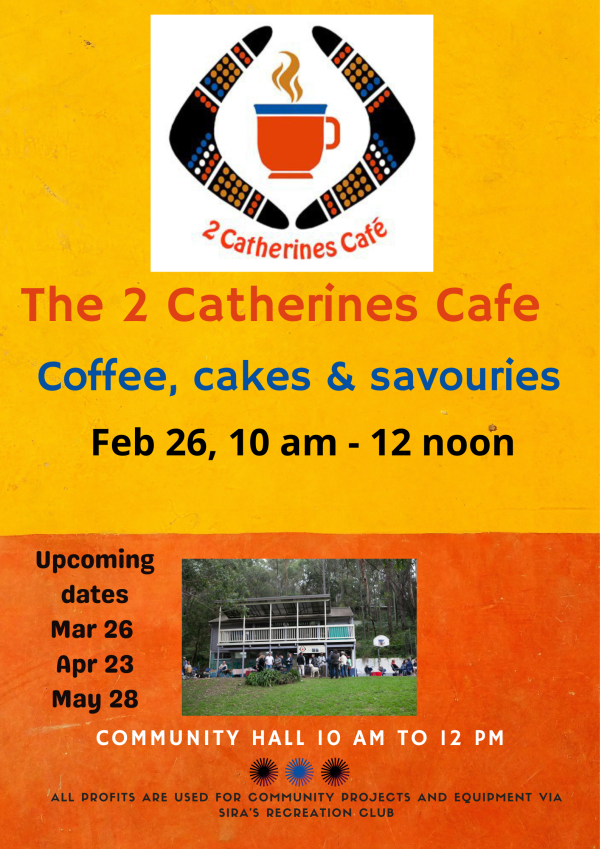 Jacqui Scruby: Candidate, NSW ParliamentScotland Island Community HallSunday 26 February, 11.30 am onwards The NSW state election is
just around the corner: 25 March is polling day.
Jacqui Scruby, independent candidate for Pittwater is visiting the island. Jacqui is keen to meet the community and listen to what matters to you. She will chat informally at the island café, then at 11.30 speak and take questions in the hall. Jacqui is an environmental
lawyer, small business owner and, most recently,
campaign manager and advisor to independent federal MP
for Mackellar, Dr Sophie Scamps. Her policy priorities
include protecting Pittwater’s special environment,
smart climate action and restoring trust and integrity
in government.
The state government is
responsible for land use planning, health, education,
transport, environmental policy and many other areas
which affect our daily lives. With the current Liberal
MP Rob Stokes retiring, and the recent success of
independents in the federal election, Pittwater will be
a contest to watch.
Although this event is being held concurrently with the café, this does not constitute an endorsement by SIRA or the Recreation Club. Other candidates are welcome to visit the café. To visit Jacqui's website, click here. International Women's Day: VoicesScotland Island Community HallSaturday 11 March, 7.30 pm onwards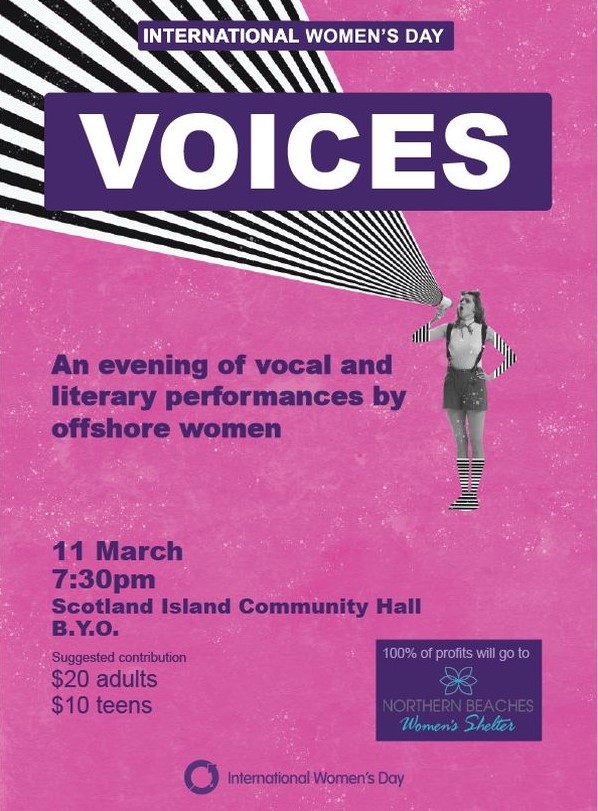 SCOTLAND ISLAND
PLAYERS - CALL FOR PARTICIPATION!
We are looking for singers, musicians and performers. We're also super keen to get teenagers involved too, so if you have a daughter who can sing or perform, we'll help and support them to find their voice. Get in touch: Barbara 0400 377 056. Graeme Crayford Memorial Run / WalkCatherine Park, Scotland IslandSunday 26 March, 9:20 am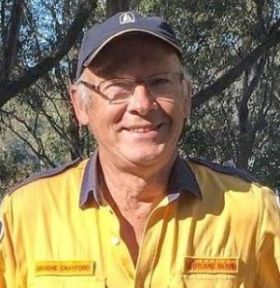 Join
us for the third annual island run/walk, once again
held in memory of Graeme Crayford, who died last year. Join
us for the third annual island run/walk, once again
held in memory of Graeme Crayford, who died last year.
Graeme made many contributions to the island community, including in his role as president of the island fire brigade. But many will also remember him as a regular island jogger. What better way to honour Graeme’s memory, keep fit and raise money for the fire brigade than to join us on another Graemesque jaunt around the island. Once again we include a special walkers' category, so you can participate at your own pace. A number of participants have already expressed interest, ranging in age from 9 to 80. Like last year, the event will incorporate a fun obstacle course. But if you are fit enough to walk around the island then the obstacle course won’t be anything you can’t handle. There will be separate
prizes according to your age and gender. For those who
participated in previous years, there will also be
prizes for best personal improvement.
 Entry: $20. This
includes a hot drink and breakfast at the island café,
which will be operating in the park alongside the
event. Profits go to Scotland Island Rural Fire
Brigade.
Registration is
essential. For full details, including
information on how to register, please download the
race information sheet, available here. The link to register is here.
Once again, Andy Derijk,
personal trainer and Elvina Bay resident, is donating
his time to help organise and facilitate the event.
Andy offers one-on-one personal training, as well as
fitness classes in Elvina Bay. To contact Andy about
this race or his fitness training, phone 0418 613 890.

Missed out on a previous newsletter? Past newsletters,
beginning May 2000, can be found at https://ymlp.com/archive_gesgjgm.php.
To ContributeIf you would like to contribute to this newsletter, please send an e-mail to the editor (editor@scotlandisland.org.au).Subscription InformationTo subscribe or unsubscribe, go to: http://www.scotlandisland.org.au/signup.
Scotland Island Community CalendarFor further information on island events, click hereThe Online Local Contacts GuideClick here to loadSIRA Photo Archive |
||||||||||||||||||||
 |
||||||||||||||||||||
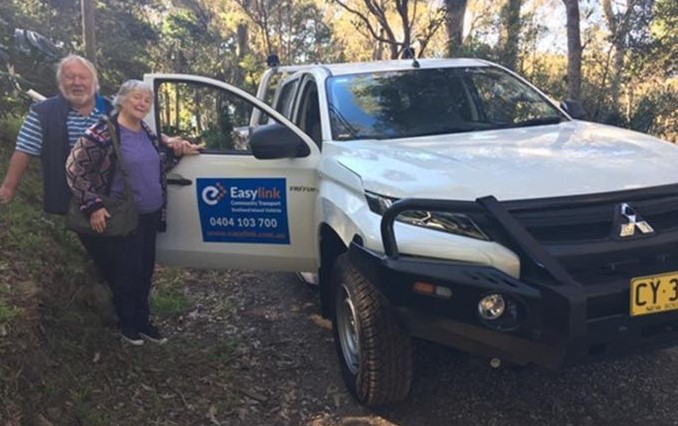
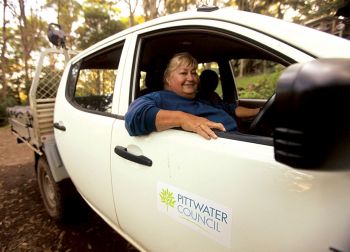
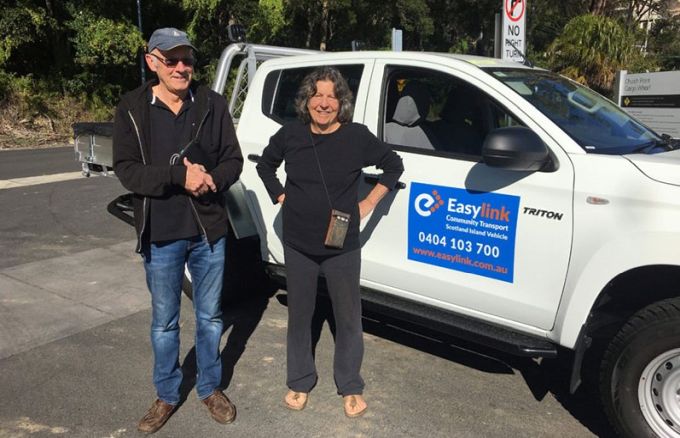
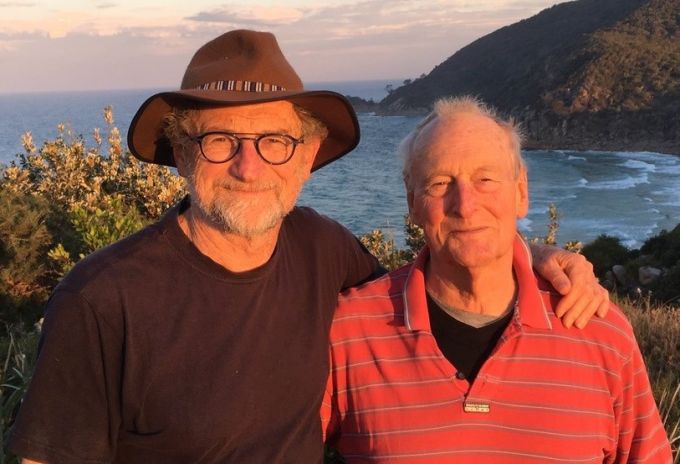

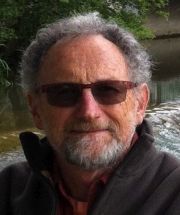
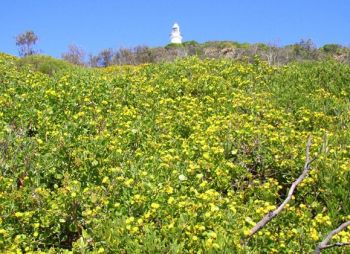
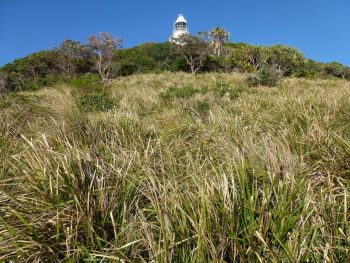
 Members
take it in turn to design a session. For the first
meeting of 2023, Roy Baker asks: 'should we be "world
citizens"? The label might sound appealing if you
shun nationalism and care for humanity as a whole. But
what does 'world citizenship' actually entail? (NB this
topic has been carried over from January's meeting,
which was cancelled.)
Members
take it in turn to design a session. For the first
meeting of 2023, Roy Baker asks: 'should we be "world
citizens"? The label might sound appealing if you
shun nationalism and care for humanity as a whole. But
what does 'world citizenship' actually entail? (NB this
topic has been carried over from January's meeting,
which was cancelled.) 


